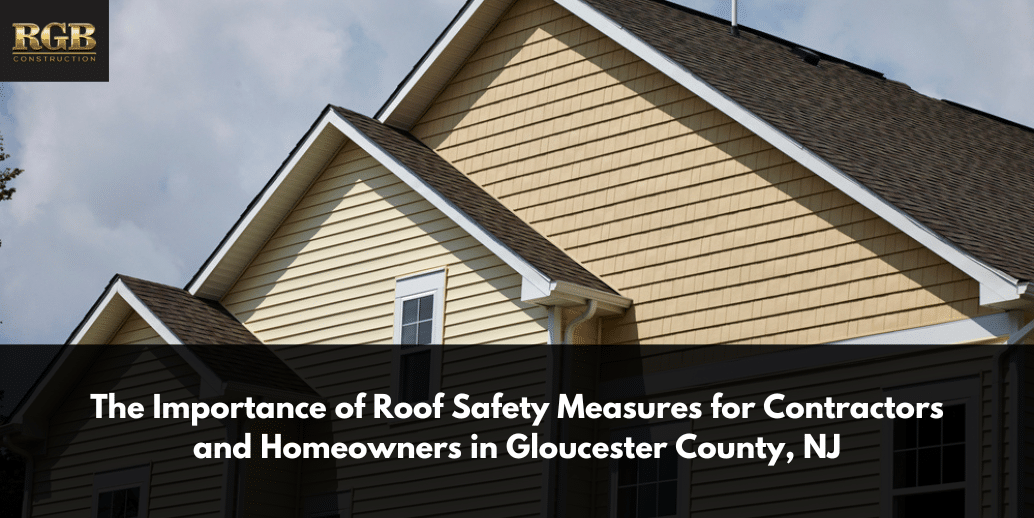Roof safety is paramount for both contractors and homeowners in Gloucester County, NJ. With roofing work involving significant heights, sharp tools, and heavy materials, the risk of accidents is high. Implementing proper safety measures can prevent injuries, protect property, and ensure successful roofing projects. Let’s go over the importance of roof safety and offers essential tips for contractors and homeowners to maintain a safe work environment.
Key Takeaways
- Roof safety is crucial for preventing injuries and ensuring successful roofing projects, involving significant heights, sharp tools, and heavy materials.
- Contractors must adhere to safety protocols, including proper training, use of PPE, regular safety inspections, monitoring weather conditions, and maintaining clear communication and supervision.
- Homeowners should select reputable contractors, clear the work area, stay informed about the project, secure pets and children, and understand emergency procedures.
- Safety measures protect contractors from legal and financial penalties and ensure compliance with OSHA regulations, while homeowners maintain a safe environment around their property.
Why Roof Safety Matters for Contractors and Homeowners in New Jersey
Roofing projects, whether repairs or installations, come with inherent dangers. Falls, electrical hazards, and injuries from tools are common risks. For contractors, adhering to safety protocols not only protects their workforce but also ensures compliance with Occupational Safety and Health Administration (OSHA) regulations, avoiding legal and financial penalties. Homeowners, on the other hand, must be aware of these risks to maintain a safe environment around their property and to choose reputable, safety-conscious contractors.
Safety Measures for Contractors in Gloucester County, NJ
Roofing contractors are professionals who work on residential and/or commercial roofs. In New Jersey and beyond, it is important for these professionals to be committed to the safety of the team to ensure the best outcome. Here are some safety measures used by contactors:
Proper Training and Certification
Ensuring that all roofing personnel are adequately trained in safety practices is crucial. This includes understanding how to use safety equipment, recognizing hazards, and knowing emergency procedures. Certifications from recognized bodies can attest to the proficiency and commitment to safety. Additional credentials, such as a certification from a manufacturer like GAF, can show an exceptional level of education and talent. If you want a GAF Master Elite contractor working on your roof, consider calling RGB Construction.
Use of Personal Protective Equipment (PPE)
Contractors should always wear appropriate PPE, including hard hats, safety goggles, gloves, and non-slip footwear. Harnesses and fall arrest systems are essential for working at heights, reducing the risk of falls.
Regular Safety Inspections
Conducting regular safety inspections of the worksite can identify potential hazards before they cause accidents. This includes checking the condition of ladders, scaffolding, and roofing materials, as well as ensuring that all safety equipment is in good working order.
Weather Considerations
Weather can significantly impact roofing safety. Contractors should monitor weather conditions and avoid working during high winds, rain, or extreme temperatures. Wet or icy roofs are particularly hazardous and should be avoided.
Clear Communication and Supervision
Maintaining clear communication among team members ensures that everyone is aware of ongoing tasks and potential hazards. Supervisors should oversee the work to ensure safety protocols are being followed and to provide immediate assistance if needed.
Safety Tips for Homeowners When Working on The Roof
For homeowners, safety measures similar to those used by contractors are just as pertinent. Sometimes you will have to use equipment while routinely maintaining your roof, for example. Here are some ways to stay safe while working on your roof or when contractors are coming over to work:
Choose a Reputable Contractor
Homeowners should select contractors who prioritize safety and have a proven track record. Checking for proper licensing, insurance, and references can help ensure the contractor follows safety standards.
Clear the Work Area
Before any roofing work begins, homeowners should clear the surrounding area of any obstacles, such as vehicles, furniture, or landscaping elements. This prevents accidents and allows contractors to work efficiently.
Stay Informed
Homeowners should stay informed about the progress of the roofing project and any potential safety concerns. Regular communication with the contractor can provide updates and address any questions or issues promptly.
Secure Pets and Children
To prevent accidents, homeowners should keep pets and children away from the worksite. This reduces the risk of distractions and injuries during roofing activities.
Understand Emergency
Procedures Knowing the emergency procedures in case of an accident can make a significant difference. Homeowners should discuss these procedures with their contractors to be prepared for any potential emergencies.
Contact a South Jersey Roofing Contractor Today
Roof safety is a critical aspect of any roofing project in Gloucester County, NJ. For contractors, implementing rigorous safety measures protects their workers and ensures compliance with regulations. Homeowners play a crucial role by choosing reputable contractors, maintaining a safe environment around their property, and staying informed about the project. By prioritizing safety, both contractors and homeowners can prevent accidents, protect property, and ensure the successful completion of roofing projects.
RGB Construction is committed to maintaining the highest safety standards in all our roofing projects. Our team of trained professionals ensures that every job is performed safely and efficiently. Contact us today for a free estimate and to learn more about our comprehensive roofing services.







